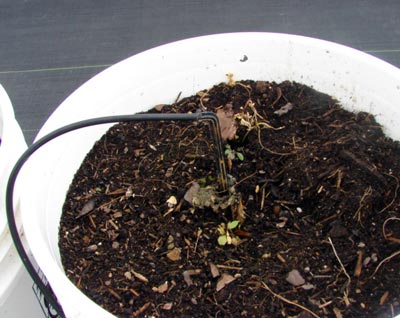Is it time to finally take the plunge into drip irrigation?
The advantages of drip irrigation are well documented, but many large- and small-scale growers still have not adopted the technology. If you’re one of those growers, maybe it’s time to take another look.

Drip irrigation is adaptable to many agricultural and landscape situations. Systems have been developed so water can easily be applied to any planting shape, size and topography. About the only crops not using drip systems are large scale, agronomic crops and those crops requiring overhead irrigation for frost protection. If you’re still a doubter or on the fence about drip irrigation, I encourage you to keep reading. Perhaps this is the year for you to change your mind.
Drip irrigation will not be perfect for all situations, but it does have several advantages in those situations where it can be used. Those advantages are described in detail below.
Increased yield. This is especially true if it can be combined with plastic mulch. I’ve had some vegetable producers tell me that by switching from bare ground production with overhead irrigation to raised, plastic-mulched, drip-irrigated beds, they were able to cut their land area in half and still double yield.
Water savings. Drip irrigation waters only the area where plants are growing using up to 50 to 70 percent less water than if the same area were overhead irrigated. Irrigation can also occur during the heat of the day when plants most need water. This is when a significant portion of overhead irrigation would be lost to evaporation
Lower pressure/lower volume. Most drip systems operate with pressures of 10 to 15 pounds, not 60 pounds or more like many overhead systems. They also don’t need the significantly higher volumes required for overhead. Limited volume systems can simply be zoned off so smaller portions can be watered separately.
More efficient use of other inputs. Being able to achieve higher yields off fewer acres makes fertilizer, pesticide, labor and other inputs more efficient. Plant maintenance activities, like pruning, staking, spraying, harvesting, etc., can also be conducted while irrigation is taking place.
More consistent soil moisture levels. Drip irrigation makes it is easier to maintain uniform soil moisture leading to more consistent uptake of nutrients needed for good growth. This is important for reducing physiological disorders such as blossom end rot in tomatoes, peppers and other susceptible crops.
Easily automated. Any size system can be set up so it can be turned on and off using programmed timers. The systems can also be controlled remotely.
Improved fertilizer application. Plants can be fed on an “as needed” basis, increasing nutrient use efficiency, plant and fruit quality and yield.
Environmentally friendly. Slow application rate and the ability to regulate flow and time decreases potential for runoff and leaching.
Flexible delivery. The ability to use tapes, emitter tubes, drippers, spikes, misters and other mechanisms and also vary rates within these mechanisms makes the system highly adaptable to many applications.

Five-gallon bucket being drip-irrigated using a spike at the end of a spaghetti tube.
Overall economy. Drip systems can be installed, maintained and operated generally at lower costs than other systems.
For current and would-be irrigators wanting more information about drip or other water delivery systems, Michigan State University Extension is offering several irrigation workshops over the next few weeks. All workshops are designed to help irrigators understand Michigan water use and withdrawal and the three sites mentioned below have a session specific for drip irrigation.
On-site registration for the workshops begin at 8:30 a.m. with programs starting at 9 a.m. and ending at 4:30 p.m. Lunch is included. Restricted use pesticide certification credits and certified crop advisor (CCA) credits will be available through these programs. The registration fee for all workshops is $50 per person.
For the Dundee, Frankenmuth and Grand Rapids dates, the registration deadline is March 10, after which registration is $75. Registration forms and more information can be found at the 2014 Irrigation Workshops Event webpage. Questions may be directed to ANR Event Services at events@anr.msu.edu or 517-353-3175.



 Print
Print Email
Email




